Senate confirms Saltzman as next chief of the U.S. Space Force
Thursday, 29 September 2022 23:02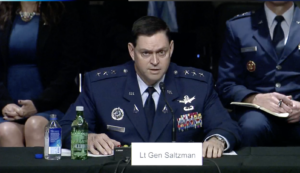
The Senate on Sept. 29 confirmed the nomination of Lt. Gen. B. Chance Saltzman for promotion to general and assignment as the chief of space operations of the U.S. Space Force
First ViaSat-3 enters environmental testing
Thursday, 29 September 2022 21:38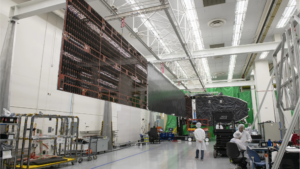
Viasat said Sept. 29 its inaugural ViaSat-3 satellite has started environmental tests after being put into flight configuration for the first time.
The post First ViaSat-3 enters environmental testing appeared first on SpaceNews.
Hungary’s 4iG to buy a majority of Spacecom in stages
Thursday, 29 September 2022 20:51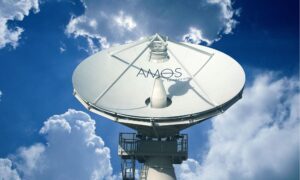
4iG, a Hungarian provider of terrestrial communications, plans to buy a majority stake in Israeli satellite operator Spacecom in stages following resistance from Israel’s government.
The post Hungary’s 4iG to buy a majority of Spacecom in stages appeared first on SpaceNews.
Kendall: Power competition in space becoming more destabilizing
Thursday, 29 September 2022 20:14
Air Force Secretary Frank Kendall said China and Russia "have been working on offensive capability to counter our space systems."
The post Kendall: Power competition in space becoming more destabilizing appeared first on SpaceNews.
New asteroid strike images show impact 'a lot bigger than expected'
Thursday, 29 September 2022 19:50 The James Webb and Hubble telescopes on Thursday revealed their first images of a spacecraft deliberately smashing into an asteroid, as astronomers indicated that the impact looks to have been much greater than expected.
The world's telescopes turned their gaze towards the space rock Dimorphos earlier this week for a historic test of Earth's ability to defend itself against a potential life-
The James Webb and Hubble telescopes on Thursday revealed their first images of a spacecraft deliberately smashing into an asteroid, as astronomers indicated that the impact looks to have been much greater than expected.
The world's telescopes turned their gaze towards the space rock Dimorphos earlier this week for a historic test of Earth's ability to defend itself against a potential life- Potential first traces of the first stars
Thursday, 29 September 2022 19:50 Astronomers may have discovered the ancient chemical remains of the first stars to light up the Universe. Using an innovative analysis of a distant quasar observed by the 8.1-meter Gemini North telescope on Hawai'i, operated by NSF's NOIRLab, the scientists found an unusual ratio of elements that, they argue, could only come from the debris produced by the all-consuming explosion of a 300-solar-
Astronomers may have discovered the ancient chemical remains of the first stars to light up the Universe. Using an innovative analysis of a distant quasar observed by the 8.1-meter Gemini North telescope on Hawai'i, operated by NSF's NOIRLab, the scientists found an unusual ratio of elements that, they argue, could only come from the debris produced by the all-consuming explosion of a 300-solar- NASA postpones Crew-5 mission over Hurricane Ian
Thursday, 29 September 2022 19:50 NASA is shifting the launch date of its Crew-5 mission to the International Space Station in the wake of Hurricane Ian, the space agency confirmed.
"The safety of the crew, ground teams, and hardware are of the utmost importance to NASA and SpaceX," NASA said in a statement on the agency's website.
The launch will now take place no earlier than 12 p.m. EDT on Wednesday, Oct. 5. A
NASA is shifting the launch date of its Crew-5 mission to the International Space Station in the wake of Hurricane Ian, the space agency confirmed.
"The safety of the crew, ground teams, and hardware are of the utmost importance to NASA and SpaceX," NASA said in a statement on the agency's website.
The launch will now take place no earlier than 12 p.m. EDT on Wednesday, Oct. 5. A Majority of tracked Russian ASAT debris has deorbited
Thursday, 29 September 2022 19:23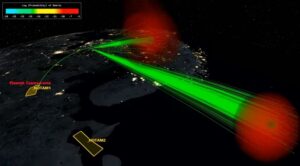
Nearly two-thirds of the debris tracked from last year’s Russian anti-satellite (ASAT) test has since deorbited, but it could take more than a decade for the rest to reenter.
The post Majority of tracked Russian ASAT debris has deorbited appeared first on SpaceNews.
FCC approves new orbital debris rule
Thursday, 29 September 2022 15:39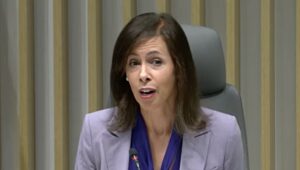
The FCC adopted a new rule Sept. 29 that will shorten the time for satellite operators to deorbit low Earth orbit satellites from 25 to 5 years.
The post FCC approves new orbital debris rule appeared first on SpaceNews.
Rover findings offer glimpse of Red Planet's ancient landscape
Thursday, 29 September 2022 15:20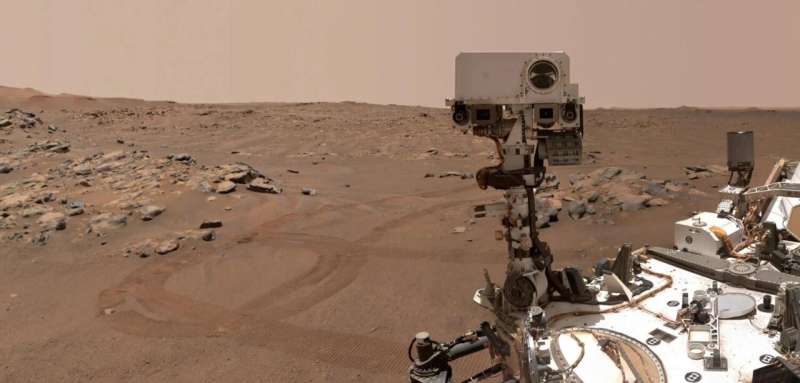
CU Boulder geologist Lisa Mayhew is among the scientists working to recreate the history of an ancient landscape that wouldn't look out of place in Utah—only this terrain sits on Mars millions of miles from Earth.
Mayhew is a member of the science team for NASA's Mars 2020 mission, which is led by the Jet Propulsion Laboratory in southern California. In August, she and her colleagues published some of the first sets of results from the Perseverance rover's exploration of the Red Planet.
The findings take a deep look at Jezero Crater. More than 3 billion years ago, a large asteroid struck Mars, forming this geologic feature that stretches almost 30 miles across and contains rolling sand dunes and craggy cliffs. Using a suite of scientific instruments aboard the Perseverance rover, which is about the size of an SUV, the researchers have begun to explore that landscape's past—showing how igneous rock forms the crater floor and how water reshaped the rocks during a time when a vast lake likely filled this region.
Testing time for Mars
Thursday, 29 September 2022 15:15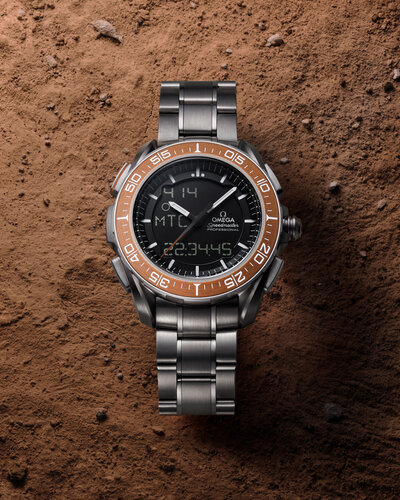
Swiss watch brand Omega has teamed up with ESA to launch the Marstimer: the first watch to display the time on Earth and Mars. Developed in partnership with ESA’s Mars exploration teams and tested at ESA ESTEC, this new watch is space-tough and Mars-mission ready.
Three Russian cosmonauts return from space station
Thursday, 29 September 2022 13:16Three Russian cosmonauts touched down Thursday on the steppe of Kazakhstan following a six-month mission on the International Space Station (ISS), Russia's space agency Roscosmos said.
Oleg Artemyev, Denis Matveyev and Sergey Korsakov landed at the scheduled time of 1057 GM, 148 kilometers (91 miles) southeast of the town of Zhezkazgan.
Footage broadcast by Roscosmos showed the cosmonauts being helped from the Soyuz descent module, as they become used to the effects of gravity again.
During their 195 days aboard the station, the crew completed multiple experiments and five space walks, Roscosmos said.
The three-person crew blasted off to the ISS to begin their mission in mid-March, weeks after Moscow sent troops into Ukraine starting what it called a "military operation".
In July, Roscosmos posted a photograph of the trio aboard the ISS holding flags of the Kremlin-backed breakaway Lugansk and Donetsk regions to voice support for Moscow's troops in eastern Ukraine.
Their return to Earth comes as four Moscow-held regions of Ukraine—including Lugansk and Donetsk—call on President Vladimir Putin to formally annex the territories into Russia following hastily organized votes that the West says were a sham.
In response to Russia's military campaign in Ukraine, Western capitals have hit Moscow with unprecedented sanctions, including on the aerospace industry.
3 Russian cosmonauts return safely from Intl Space Station
Thursday, 29 September 2022 13:16Three Russian cosmonauts touched down Thursday on the steppe of Kazakhstan following a six-month mission on the International Space Station (ISS), Russia's space agency Roscosmos said.
Oleg Artemyev, Denis Matveyev and Sergey Korsakov landed at the scheduled time of 1057 GM, 148 kilometers (91 miles) southeast of the town of Zhezkazgan.
Footage broadcast by Roscosmos showed the cosmonauts being helped from the Soyuz descent module, as they become used to the effects of gravity again.
During their 195 days aboard the station, the crew completed multiple experiments and five space walks, Roscosmos said.
The three-person crew blasted off to the ISS to begin their mission in mid-March, weeks after Moscow sent troops into Ukraine starting what it called a "military operation".
In July, Roscosmos posted a photograph of the trio aboard the ISS holding flags of the Kremlin-backed breakaway Lugansk and Donetsk regions to voice support for Moscow's troops in eastern Ukraine.
Their return to Earth comes as four Moscow-held regions of Ukraine—including Lugansk and Donetsk—call on President Vladimir Putin to formally annex the territories into Russia following hastily organized votes that the West says were a sham.
In response to Russia's military campaign in Ukraine, Western capitals have hit Moscow with unprecedented sanctions, including on the aerospace industry.
First images of asteroid strike from Webb, Hubble telescopes
Thursday, 29 September 2022 13:14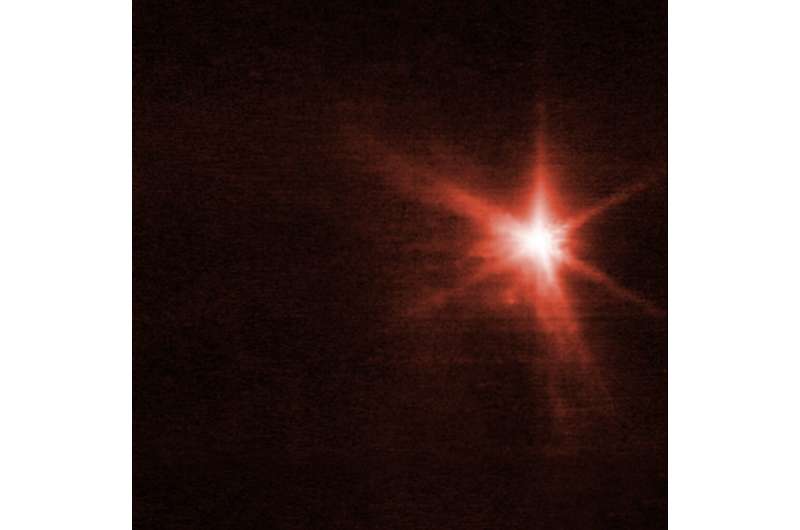
The James Webb and Hubble telescopes on Thursday revealed their initial images of a spacecraft deliberately crashing into an asteroid, marking the first time the two most powerful space telescopes have observed the same celestial object.
The world's telescopes turned their gaze towards the space rock Dimorphos earlier this week for a historic test of Earth's ability to defend itself against a potential future life-threatening asteroid.
Astronomers rejoiced as NASA's Double Asteroid Redirection Test (DART) impactor slammed into its pyramid-sized target 11 million kilometers (6.8 million miles) from Earth on Monday night.
Images taken by Earth-bound telescopes showed a vast cloud of dust expanding out of Dimorphos—and its big brother Didymos which it orbits—after the spacecraft hit.
Insights into Utopia Basin revealed by Mars rover Zhurong
Thursday, 29 September 2022 11:08 A new radar image obtained by China's Mars rover Zhurong provides insights into the surface structure of the Utopia Planitia basin. The findings - which reveal multiple sub-layers suggestive of sediment deposition following episodic flooding millions of years ago - may improve our understanding of the planets' geological and hydrological history.
Utopia is an impact crater on Mars that is
A new radar image obtained by China's Mars rover Zhurong provides insights into the surface structure of the Utopia Planitia basin. The findings - which reveal multiple sub-layers suggestive of sediment deposition following episodic flooding millions of years ago - may improve our understanding of the planets' geological and hydrological history.
Utopia is an impact crater on Mars that is 
